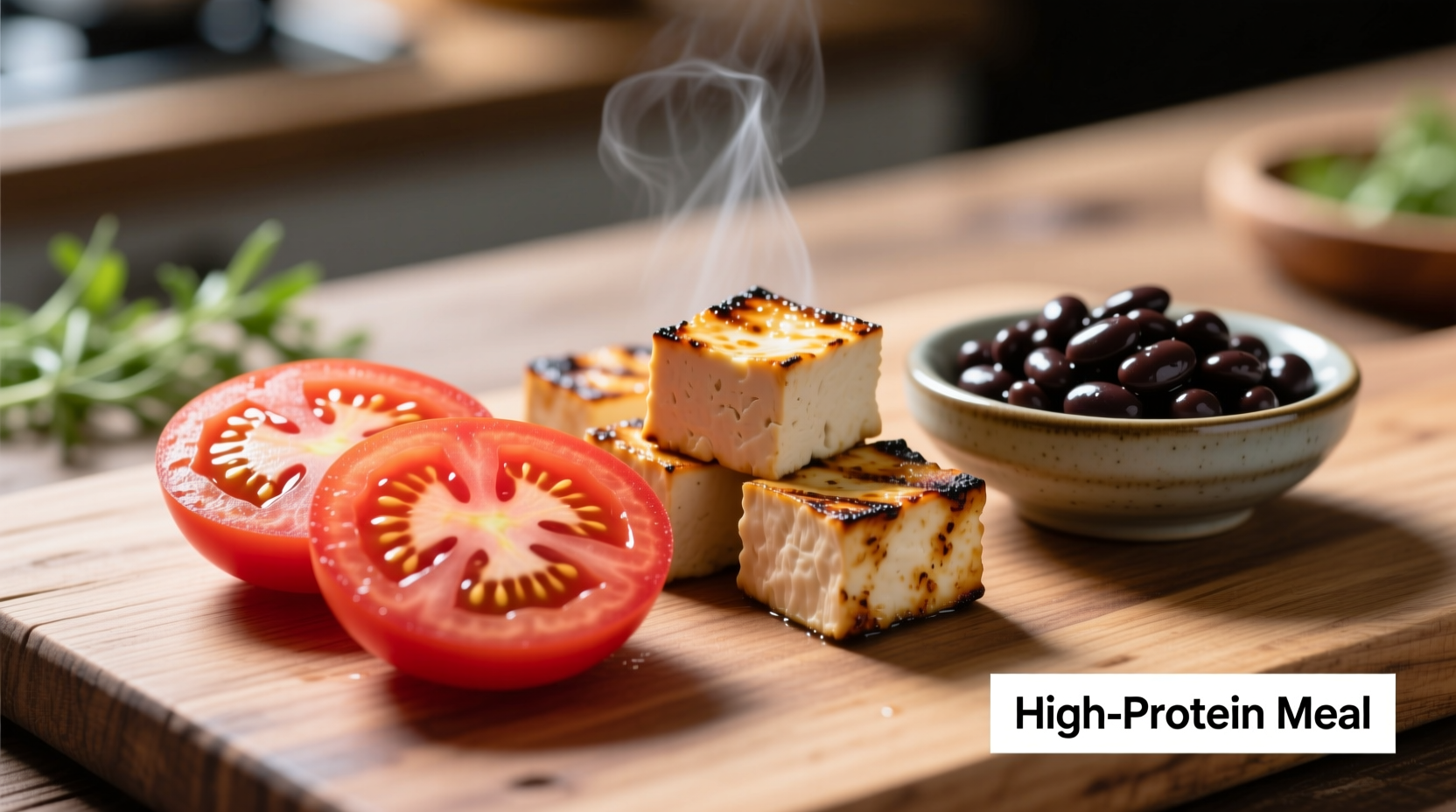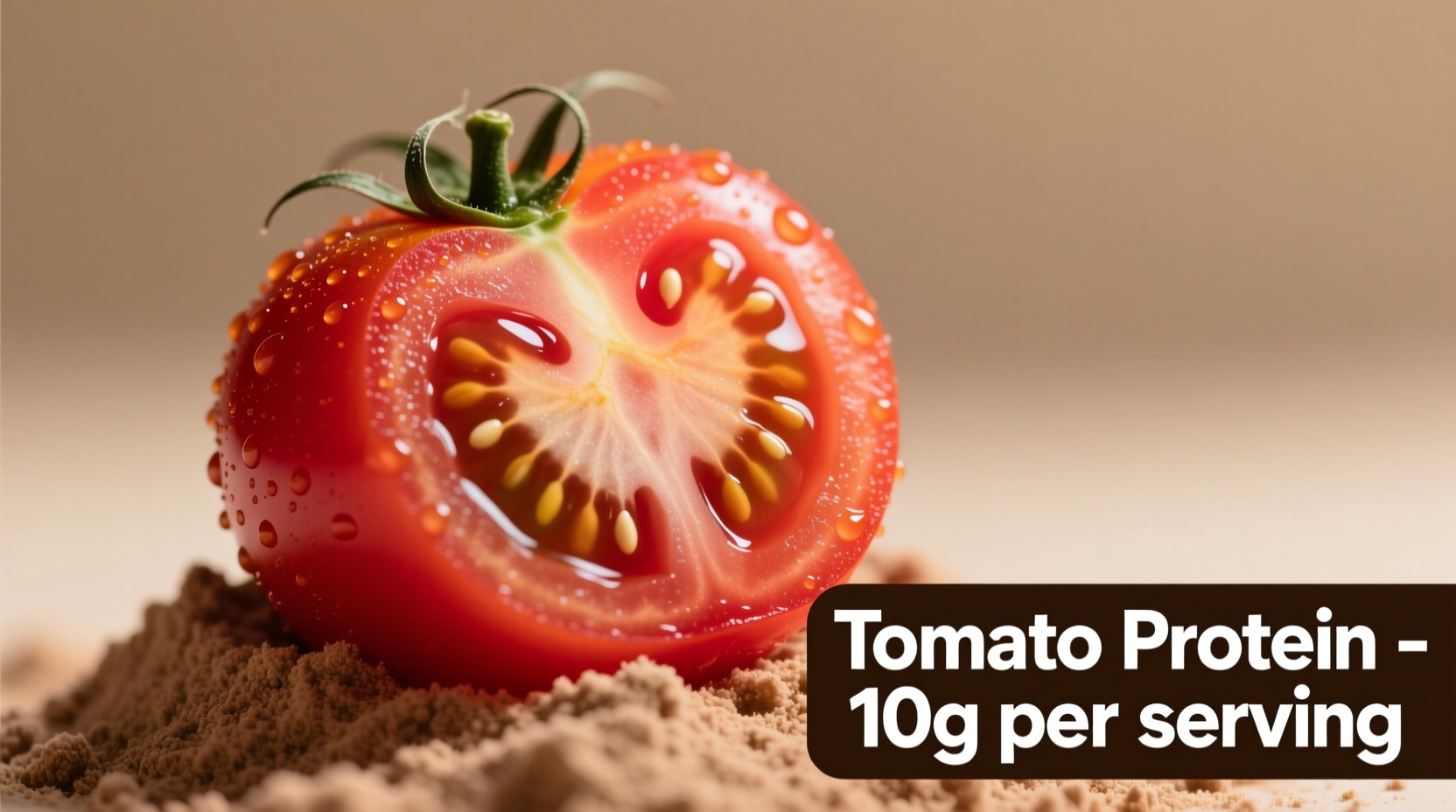When searching for “tomato protein,” most people expect tomatoes to be a meaningful protein source. The reality? A medium tomato (123g) provides only about 1.1 grams of protein—less than 2% of your daily needs. This article clarifies misconceptions, examines actual tomato protein composition, and identifies when tomato-derived protein might be relevant to your nutrition.
Why Tomato Protein Is Misunderstood
The confusion stems from two sources: marketing terms like “tomato protein isolates” used in food science, and general misinformation about plant protein sources. While tomatoes contain all nine essential amino acids, their total protein concentration is too low to qualify as a protein-rich food. Let's examine the facts.
Actual Protein Content in Tomatoes
According to USDA FoodData Central, raw tomatoes contain just 0.88 grams of protein per 100 grams. For perspective:
| Food | Protein (per 100g) | Protein Quality |
|---|---|---|
| Raw tomatoes | 0.88g | Incomplete profile |
| Chicken breast | 31g | Complete protein |
| Lentils | 9g | Complementary profile |
| Tofu | 8g | Complete protein |
This fact comparison shows why tomatoes shouldn't be relied upon for protein needs. Their amino acid profile lacks sufficient methionine and cysteine, making it an incomplete protein source when consumed alone.
The Evolution of Tomato Protein Research
While whole tomatoes aren't protein powerhouses, food scientists have explored tomato byproducts for protein extraction:
- 1980s: Initial research into tomato seed protein extraction began, focusing on waste reduction in tomato processing
- 2005: Studies confirmed tomato seed meal contains 20-25% protein, sparking interest in byproduct utilization
- 2015: Research demonstrated potential for tomato seed protein isolates as functional food ingredients
- 2022: Commercial applications emerged in pet food and specialty vegetarian products
These developments explain why “tomato protein” appears in search results—but they refer to processed isolates, not whole tomatoes.
When Tomato Protein Matters Practically
For home cooks and nutrition-conscious eaters, tomato protein relevance falls into specific contexts:
- Industrial applications: Tomato seed protein is used in some meat alternatives and pet foods
- Waste reduction: Processing facilities extract protein from tomato pomace (seeds and skins)
- Niche supplements: Rare specialty products may contain concentrated tomato protein
For everyday nutrition, however, focusing on tomatoes for protein represents a fundamental misunderstanding of their nutritional profile. The National Center for Biotechnology Information confirms that fruits generally contribute minimally to protein intake compared to dedicated protein sources.
Building Balanced Plant-Based Protein
If you're exploring plant proteins, tomatoes play a supporting role rather than a starring one. Pair them strategically:
- Combine tomato-based sauces with lentils or chickpeas for complete protein profiles
- Add tomatoes to tofu scrambles for vitamin C enhancement
- Use tomato paste in bean stews to improve iron absorption
The U.S. Food and Drug Administration recommends combining various plant proteins throughout the day to ensure complete amino acid intake—tomatoes alone won't accomplish this.

Practical Takeaways for Your Diet
Don't eliminate tomatoes from your diet—they're nutritional powerhouses for other reasons. But adjust your expectations:
- Enjoy tomatoes for their lycopene, vitamin C, and hydration benefits
- Don't count on them for meaningful protein contribution
- Seek dedicated protein sources like legumes, nuts, seeds, and whole grains
- Consider tomato-based dishes as flavor enhancers for protein-rich meals
Remember that a balanced approach delivers better results than focusing on single nutrients. The Dietary Guidelines for Americans emphasize dietary patterns over individual food components for optimal health.
Frequently Asked Questions
Do tomatoes contain complete protein?
No, tomatoes contain incomplete protein lacking sufficient methionine and cysteine. While they provide all nine essential amino acids in trace amounts, the total protein quantity is too low to be nutritionally significant for protein needs.
Can tomato seeds provide meaningful protein?
Tomato seeds contain about 20-25% protein by weight, making them more protein-dense than the fruit itself. However, you'd need to consume large quantities of seeds to get significant protein, which isn't practical in normal diets.
Are there tomato protein supplements available?
While tomato protein isolates exist for industrial food production, they're not marketed as consumer supplements. You won't find tomato protein powder on store shelves like pea or whey protein. Any product claiming to be “tomato protein supplement” likely contains minimal actual tomato protein.
How much tomato would I need to eat for 20g of protein?
You'd need to consume approximately 2.3 kilograms (over 5 pounds) of raw tomatoes to get 20g of protein. This is neither practical nor nutritionally advisable, as you'd consume excessive water and carbohydrates while missing essential amino acids.
Does cooking tomatoes affect their protein content?
Cooking has minimal impact on tomato protein content. While some protein denaturation occurs with heat, the total protein quantity remains essentially unchanged. Concentrated tomato products like paste have slightly higher protein per volume due to water removal, but still remain low-protein foods.











 浙公网安备
33010002000092号
浙公网安备
33010002000092号 浙B2-20120091-4
浙B2-20120091-4